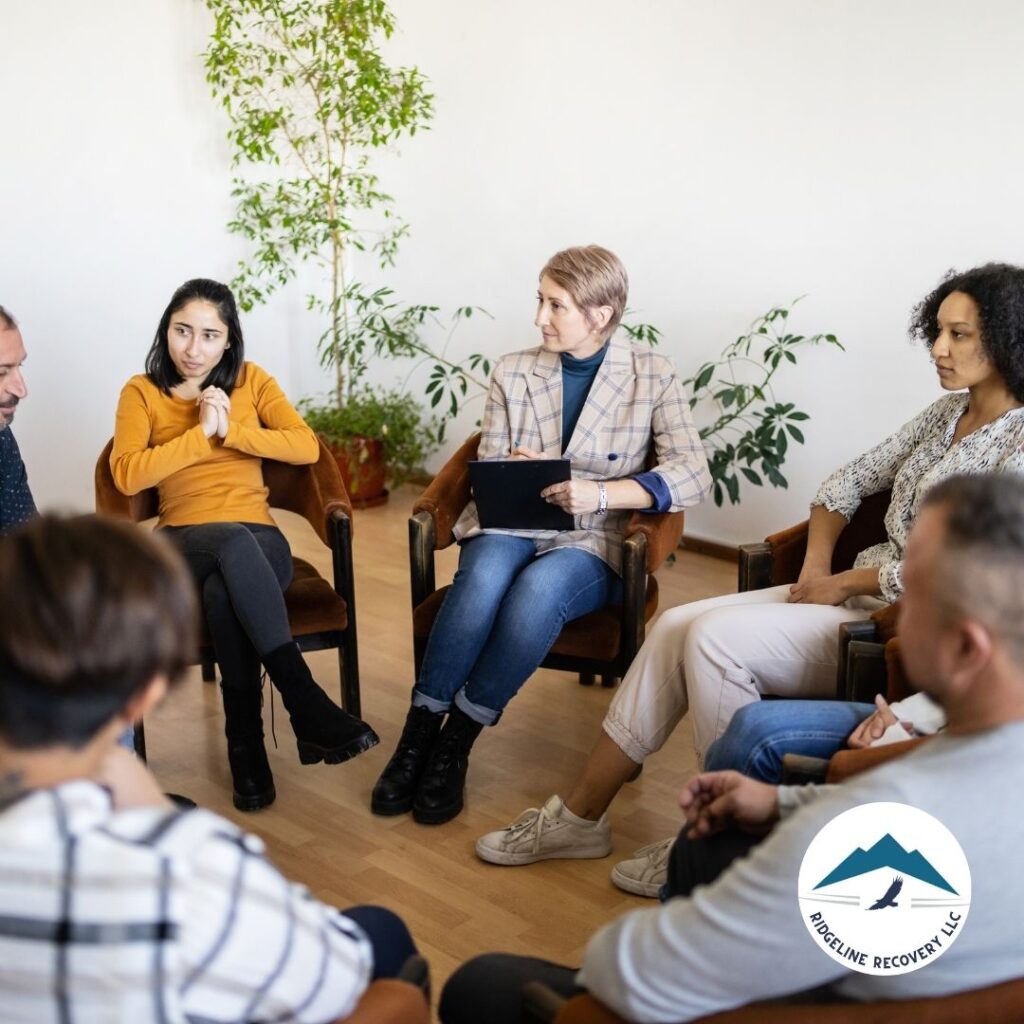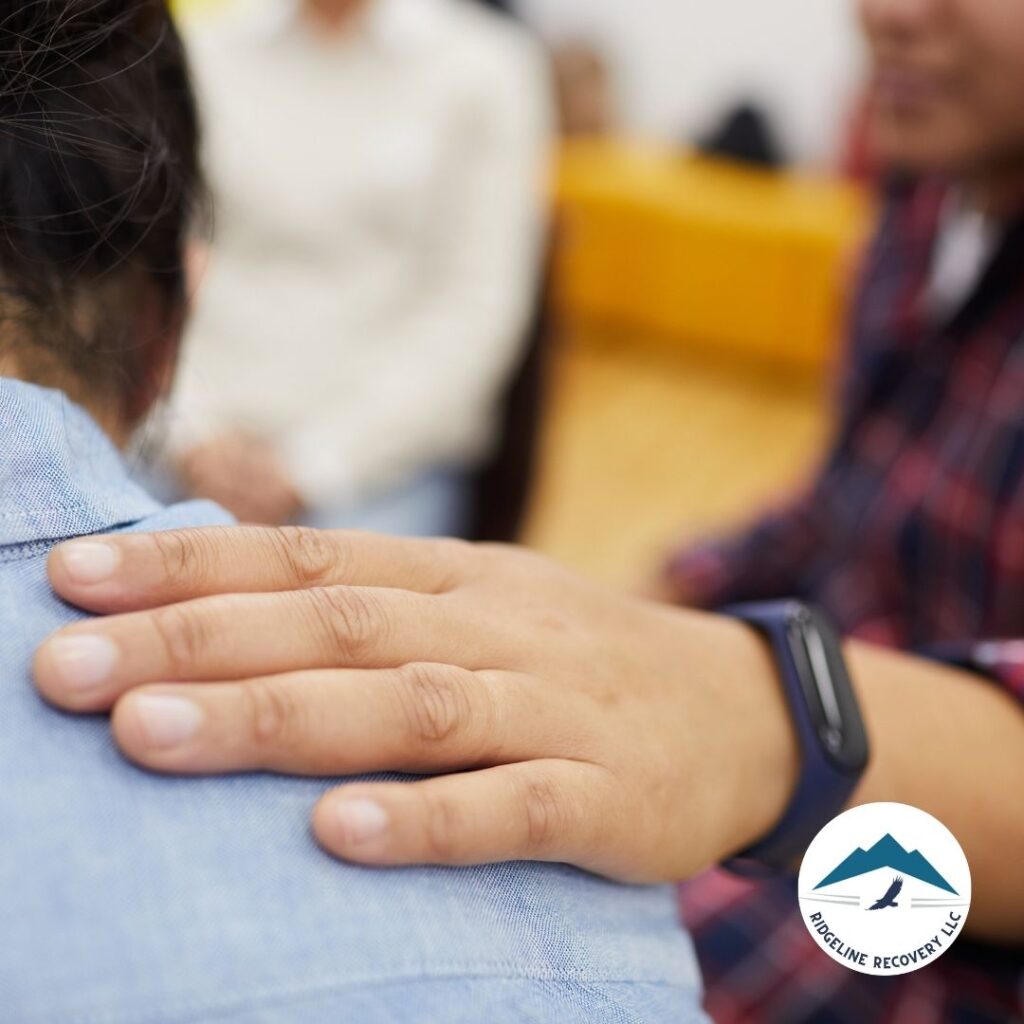Why Addiction Treatment Columbus Matters
You’re here because either you, or someone you care about, is fighting an uphill battle with addiction. Maybe you’ve tried to quit on your own, but those cravings keep pulling you back.
Or perhaps, you’ve already been through several programs and are wondering, “Will addiction treatment Columbus be any different?”
Let’s talk about that.
Addiction recovery is more than just giving up a substance.
It’s about rebuilding yourself from the ground up.
At Ridgeline Recovery, we understand that addiction isn’t one-dimensional.
It’s complex.
So, if you’re looking for addiction therapy near me, know that this isn’t just about quick fixes.
It’s about true transformation.
Here’s what we’re going to cover in this guide:
- What addiction treatment Columbus entails
- Why mental health matters in recovery
- The comprehensive therapy options available at Ridgeline Recovery
- Addressing your most pressing FAQs
Ready? Let’s dive into why getting help in addiction treatment Columbus could be the game-changer you’ve been looking for.
Why Choose Addiction Treatment Columbus?
Addiction doesn’t just happen in a vacuum.
It affects everything: your mind, your relationships, your future.
And finding addiction treatment near me that goes beyond the surface level is rare.
Let’s break down the real value of addiction treatment Columbus:
- Support Networks: Columbus has a network of support systems and specialized programs, which is ideal for anyone serious about recovery.
- Diverse Therapy Options: Options like holistic therapy or medication-assisted treatment (MAT) make a difference.
- Mental Health Integration: Many struggle with addiction and mental health issues simultaneously. A solid treatment center knows you can’t separate the two.
Finding help isn’t about judgment or guilt.
It’s about creating a foundation to thrive.
The Framework of Addiction Treatment Columbus: From Detox to Sobriety
So, what actually happens in addiction treatment Columbus?
Here’s the typical path from start to finish:
1. Detoxification: Clearing the Way for Recovery
Detox can sound intimidating, but it’s crucial. Clearing substances from your system is often the first step toward recovery.
Facilities offering detoxification near me or detox centers play a key role here.
Why Detox Matters:
- Safety: Withdrawal isn’t just uncomfortable; it can be dangerous, especially with substances like alcohol or opioids.
- Clarity: Clearing the body helps you engage fully in therapy.
Many people opt for inpatient detox centers near me because 24/7 support is essential.
And if you’re facing something severe like dts delirium tremens, medical supervision is non-negotiable.
2. Comprehensive Therapy: The Core of Recovery
Detox alone won’t cut it. The next step is building an arsenal of mental tools to understand and combat addiction.
This is where addiction therapy Columbus becomes crucial.
Therapies in addiction treatment Columbus include:
- Cognitive Behavioral Therapy (CBT): This is a go-to because it helps you identify the patterns driving your addiction.
- Group Therapy: Sharing experiences creates accountability and reduces the sense of isolation.
- Holistic Therapy: Incorporating meditation, yoga, and mindfulness to support mental clarity.
Therapy builds the resilience needed to handle triggers, avoid relapse, and stay sober long-term.
3. Medication-Assisted Treatment (MAT)
For some, quitting “cold turkey” isn’t just hard—it’s unsustainable.
That’s where medication-assisted treatment (MAT) can be a huge asset in addiction treatment Columbus.
Medication options include:
- Vivitrol: Helps reduce cravings by blocking the euphoric effects of drugs and alcohol.
- Methadone vs Suboxone: Common for those recovering from opioids, each with unique benefits.
It’s not a “one-size-fits-all” approach.
Facilities like vivitrol clinics near me provide consultations to determine what fits your needs best.
Why Mental Health Matters in Addiction Treatment Columbus
If you’re searching for mental health services near me, you’re on the right path.
Addiction is rarely just about the substance—it’s often tied to mental health.
Mental Health and Addiction Go Hand in Hand
This Mental health issues like depression, anxiety, and trauma often fuel addiction. Mental health clinics near me can provide the right tools and support to address this side of recovery.
- Trauma Support: Many people with addiction have a history of trauma. Therapy can help break that cycle.
- Anxiety and Depression Management: Learning to manage these without substances is a cornerstone of recovery.
- Holistic Options: Programs that offer holistic therapy or mental health help near me support recovery from all angles.
Don’t overlook the mental health piece.
At Ridgeline Recovery, we integrate mental health treatment with addiction therapy to address both sides of the issue.
Building Long-Term Sobriety: Moving Beyond Addiction
Sobriety isn’t just about quitting; it’s about living better.
Once you complete addiction treatment Columbus, it’s crucial to create a life that makes staying sober worth it.
Sober Living Support
Places like sober living homes near me provide a safe space to build life skills and independence without falling back into old habits.
- Structure and Routine: Daily schedules reduce the chance of relapse.
- Community: Being around others who “get it” reduces the urge to go back.
- Accountability: You’ll have people looking out for your progress.
Recovery communities in Columbus make sober living sustainable and meaningful.
Life Skills for the Real World
Addiction treatment Columbus isn’t just about stopping a substance; it’s about learning to manage life.
This includes:
- Career Counseling: To help you find purpose and stability.
- Relationship Skills: Repairing damaged relationships or building new ones.
- Stress Management: Life doesn’t stop being stressful. Skills here make a difference.
Frequently Asked Questions: Addiction Treatment Columbus
1. What should I expect from addiction therapy near me?
Therapy is about self-discovery and change.
Expect to confront your habits, address traumas, and learn new coping skills.
The goal is to leave with a toolkit for managing cravings and rebuilding your life.
2. Can I afford addiction treatment Columbus?
Insurance like Blue Cross Blue Shield Ohio often covers part of the cost.
Facilities work with you to make payments manageable, so financial barriers aren’t stopping you from recovery.
3. What if I have a co-occurring mental health disorder?
Dual-diagnosis treatment is designed for exactly this.
Mental health services are integrated into the program to ensure that both issues are addressed together.

Deep Dive into Addiction Treatment Columbus: Navigating Each Phase of Recovery
Addiction recovery isn’t a “one-and-done” process; it’s a series of intentional steps. Let’s get into more depth on how addiction treatment Columbus unfolds and what makes it different here at Ridgeline Recovery.
Phase 1: Assessment and Personalized Treatment Planning
The initial assessment is where we dig in. This phase is about understanding your unique history with addiction, mental health challenges, family dynamics, and support network.
Why Assessment is Key
A solid assessment lets us get the complete picture. It’s like taking inventory—you can’t fix what you don’t fully understand.
- Substance Use History: The specific substances used, how long, and to what degree all play into the approach.
- Mental Health Screening: Identifying co-occurring mental health issues early, like anxiety or PTSD, is essential.
- Family and Social Dynamics: Many times, we find that environments or relationships contribute to addiction. Understanding your social circle and family support is a big part of a sustainable recovery plan.
Once we have this information, a personalized plan is mapped out. This plan will look different for everyone; maybe it includes a stay in inpatient drug rehab facilities near me, or perhaps an outpatient structure is more suitable. Each journey is distinct.
Phase 2: Intensive Therapy and Building Core Skills
Let’s say you’re moving past detox—this is where the real work begins. Therapy isn’t just about talking; it’s where you build your mental toolkit.
Types of Therapy in Addiction Treatment Columbus
- Cognitive Behavioral Therapy (CBT): For many, CBT is a breakthrough. It teaches you how to identify and reshape destructive thoughts and behaviors.
- Group Therapy: We’ve seen firsthand how sharing stories in a safe space reduces isolation. Knowing you’re not alone can be powerful.
- Family Therapy: Addiction often damages family ties. Rebuilding these connections is essential, especially if you’ll return to a home environment after treatment.
- Holistic Therapy: From meditation to physical fitness, holistic approaches help with managing stress, emotions, and overall well being.
These therapies tackle everything from acute withdrawal symptoms to handling triggers in everyday life.
Phase 3: Medication-Assisted Treatment (MAT)
Medication-assisted treatment (MAT) isn’t for everyone, but it can be highly effective in many cases. Here’s what MAT looks like within addiction treatment Columbus.
Key Options in Medication-Assisted Treatment
- Vivitrol Clinics Near Me: We often recommend Vivitrol as part of our comprehensive treatment. It’s a non-addictive shot that can block the “high” from opioids and alcohol, which helps prevent relapse.
- Methadone vs Suboxone: Commonly used for opioid addiction, these medications work differently but serve the same purpose of reducing withdrawal symptoms and cravings.
It’s critical to work closely with professionals when using these medications. That’s why we make sure to incorporate MAT into a broader addiction therapy plan, so medication isn’t the only line of defense.
Long-Term Support: What Happens After Treatment?
Leaving a treatment center is both exciting and daunting. That’s why Ridgeline Recovery ensures that support doesn’t end after discharge.
Sober Living and Community Resources
If you’re nervous about stepping back into daily life, consider sober living homes near me as a transitional space. These homes are about accountability and community.
- Structured Environment: Sober living homes often require residents to adhere to a schedule and stay active in their recovery journey.
- Peer Support: Living with people on the same path can give you a solid foundation and accountability.
- Guidance and Independence: They provide a safe space to rebuild independence without being completely on your own.
Continuing Therapy and Relapse Prevention
Staying sober takes work. Our addiction treatment Columbus program includes relapse prevention, so you have the skills and knowledge to stay on track.
- Regular Therapy Sessions: Therapy doesn’t end when treatment ends. We recommend ongoing sessions, often weekly or bi-weekly, to keep your recovery strong.
- Mental Health Services Near Me: If you’re dealing with co-occurring issues like anxiety or depression, ongoing support through mental health therapist near me is essential.
- Alumni Programs and Support Groups: Staying connected to a network, whether through alumni events or groups like Narcotics Anonymous 12 steps, helps maintain the sense of community and purpose.
Additional FAQs on Addiction Treatment Columbus
What’s the role of family in addiction recovery?
Family involvement can make a huge difference in recovery. Addiction treatment Columbus programs often include family therapy, where loved ones can understand the addiction process better and learn how to support you in healthier ways.
Can I pursue addiction treatment Columbus and still go to work?
Absolutely. Outpatient programs are designed to allow flexibility for those who need to maintain their job while going through treatment. Addiction treatment near me can be customized based on your schedule, so you get the help you need without compromising your work responsibilities.
What’s the difference between inpatient and outpatient treatment?
Inpatient treatment is a 24/7 commitment where you live at the facility. It’s ideal for individuals who need constant support and a structured environment. Outpatient addiction treatment near me allows you to stay at home, offering flexibility and enabling you to maintain family or job commitments while receiving treatment.
What are the long-term effects of not seeking addiction treatment?
The long-term effects of alcohol or drugs can be devastating, leading to issues like liver disease, alcohol dementia, damaged relationships, financial instability, and a higher risk of death. It’s not just about physical health; addiction takes a heavy toll on mental health, often leading to conditions like delirium tremens or depression.
How do I handle a relapse?
Relapse doesn’t mean failure; it’s part of many people’s journey. Our addiction treatment Columbus program includes relapse prevention planning, and we help you learn how to identify triggers and handle cravings. There are always options, like re-engaging with therapy or seeking support from sober communities.
Understanding Addiction Treatment Columbus: A Comprehensive Approach to Lasting Recovery
When people think of addiction treatment, they often focus on just getting through the initial detox. But let’s be clear—that’s only one piece of the puzzle. The journey with Addiction Treatment Columbus goes far beyond initial detox or even the first few months of therapy. Here’s what a fully comprehensive approach really looks like.
Community Resources and Building a Support Network
One of the biggest shifts we see in long-term recovery success? Community involvement. Whether it’s participating in addiction therapy near me or finding a local support group, a well-rounded recovery hinges on building an empowering network. Many people underestimate the impact of support systems until they experience the positive momentum it provides.
Key Community Resources in Columbus
- Local Support Groups: Whether it’s Narcotics Anonymous 12 steps, Alcoholics Anonymous, or smaller, specialized groups, Columbus has resources for everyone. Each group offers unique experiences and shared strength.
- Vivitrol Clinics Near Me: Clinics providing MAT support can be pivotal for those needing additional support in blocking cravings and managing withdrawal.
- Mental Health Treatment Centers Near Me: Mental health clinics in Columbus offer support for co-occurring disorders, from anxiety and depression to trauma, enhancing your recovery foundation.
Involvement in these resources can give you essential connections that help maintain momentum in recovery. Addiction treatment Columbus focuses on connecting patients with these resources, recognizing that community is often the backbone of a strong recovery.

Phase 4: Lifestyle Changes That Support Recovery
We hear it all the time: “How do I keep going once I’m done with the program?” The truth is, therapy is just the start of a long-term commitment to health. The next big step is lifestyle transformation, and that’s not a one-time change—it’s a process that requires consistency, accountability, and a system that works for you.
Creating a New Routine
When individuals in recovery look to change their habits, the most powerful tool they have is their daily routine. Small choices add up to massive results over time. In addiction treatment Columbus, we teach strategies for designing routines that serve sobriety, mental health, and long-term goals.
- Setting a Schedule: A structured routine helps reduce idle time and manage stress. Incorporating daily non-negotiables like exercise, meditation, or journaling can be grounding and purposeful.
- Building a Sober Social Circle: Social settings are often a huge trigger for relapse, especially if they involve alcohol or drugs. We encourage finding local events, support groups, and activities that foster sober friendships. Many sober living homes near me also serve as great social hubs for those early in recovery.
- Self-Care and Wellness Practices: Physical health and mental health go hand in hand. Whether it’s yoga, hiking, or creative activities, staying active and mindful helps to support mood stability and confidence.
These lifestyle changes make it easier to avoid old habits and stay accountable to the goals set during addiction treatment Columbus.
Understanding the Role of Holistic Therapy in Recovery
Sometimes traditional talk therapy isn’t enough. Holistic therapy—a broad term for practices that treat the body, mind, and spirit—plays a crucial role in modern addiction recovery Columbus programs. For some, these methods offer clarity and calm that complement more intensive therapy.
Popular Holistic Therapies in Addiction Treatment
- Meditation and Mindfulness: Proven to reduce stress and improve focus, mindfulness teaches you to pause, observe your thoughts, and respond with intention. This is especially helpful in managing cravings or moments of intense emotion.
- Art and Music Therapy: Creative outlets help people express complex emotions they might struggle to verbalize in talk therapy. Many rehab programs now incorporate art and music into their treatment offerings.
- Physical Activity and Outdoor Therapies: Physical health has a direct impact on mental health. Activities like hiking, yoga, and strength training boost dopamine levels naturally, which helps to counteract the effects of addiction on the brain.
By engaging in these holistic therapies, individuals in recovery gain tools that don’t just help them in the moment; they become habits that can last a lifetime.
Embracing Ongoing Care and Therapy as a Pathway to Growth
Once someone has completed a formal addiction treatment Columbus program, they may feel like they’ve reached a finish line. But ongoing care is what solidifies everything learned. Without ongoing therapy, the work done in rehab can be hard to maintain.
Aftercare Programs and Ongoing Therapy Options
There’s a misconception that recovery is complete once rehab is over. In reality, the most successful outcomes occur when people stay connected to mental health therapist near me options and ongoing aftercare.
- Weekly or Monthly Therapy Check-ins: Continuing with a mental health counselor can provide accountability and support as you navigate life post-recovery.
- Sober Living Support: For those looking to transition out of rehab but not yet ready for full independence, sober living homes near me offer a balance of independence and structure.
- Alumni Programs and Events: Staying in touch with rehab alumni is a powerful way to stay connected to people who understand the struggles and victories unique to recovery.
Why Aftercare Matters
In the Columbus area, aftercare is often structured to help prevent the triggers and risks associated with re-entering everyday life. From alcohol rehab centers to inpatient drug rehabilitation options, these programs support a gradual transition and empower individuals to reinforce their newfound skills.
Addressing Addiction Triggers and Relapse Prevention Techniques
Everyone has different triggers, and identifying them is a critical part of relapse prevention. For some, triggers could be social situations, while for others, they’re stressors related to work or family. Here’s where addiction treatment Columbus gets specific about actionable relapse prevention strategies.
Identifying and Addressing Personal Triggers
During therapy sessions, individuals are guided through exercises to help pinpoint these triggers. Once identified, they can develop strategies to counteract them.
- Mindfulness Techniques: Practicing self-awareness helps people recognise cravings early, giving them time to respond before acting impulsively.
- Coping Skills Training: Developing positive coping mechanisms—such as calling a friend, going for a walk, or practicing deep breathing—is essential for managing tough moments.
- Support System Utilization: Keeping in close contact with friends, family, or a therapist who can provide support can make all the difference when facing triggers.
By developing these skills, individuals build a strong, personalized toolkit for maintaining their recovery outside of a formal addiction therapy Columbus environment.
The Impact of Therapy on Relationships and Social Life Post-Recovery
Addiction affects everyone involved, and healing those relationships requires intention. Therapy plays a crucial role in helping individuals rebuild trust, communicate openly, and create a supportive environment.
Family Therapy and Relationship Counseling in Recovery
When someone enters addiction treatment, the whole family system is affected. Family therapy at addiction treatment Columbus is designed to help loved ones heal together, setting boundaries and learning how to support each other better.
- Re-establishing Trust: Therapy helps rebuild the trust that’s often eroded during addiction. This process takes time, and having a counselor guide ensures that it’s done in a healthy way.
- Learning Effective Communication: Open, honest communication becomes the cornerstone of relationships post-recovery. Whether it’s with a spouse, sibling, or friend, effective communication skills reduce misunderstandings and resentment.
- Understanding Codependency: Codependency can be a significant factor in enabling addictive behaviors. Therapy helps identify these patterns, allowing families to address them constructively.
With the guidance of family therapy and relationship counseling, families in Columbus have the tools they need to rebuild healthy, supportive dynamics after addiction.
Finding Fulfillment in New Interests and Pursuits
The goal of recovery is not just to avoid relapse but to thrive. Rediscovering interests, picking up hobbies, and exploring new career paths all contribute to a fulfilling life beyond addiction. Addiction treatment Columbus supports this by encouraging people to explore areas of personal growth.
Examples of Positive Pursuits for Life After Recovery
- Creative Outlets: Rediscovering creative interests, whether it’s through writing, painting, or photography, gives people a sense of purpose and accomplishment.
- Physical Fitness: Joining a gym or participating in group sports offers a community as well as an outlet for stress relief and natural dopamine boosts.
- Volunteer Work: Many find purpose in giving back, especially within recovery communities. Becoming a mentor or a sponsor can be deeply rewarding and grounding.
New pursuits provide individuals with a renewed sense of identity and purpose, making it easier to sustain their sobriety.
Closing Thoughts: Your Next Step with Addiction Treatment Columbus
If you’re on the journey to recovery or supporting someone who is, know this: Addiction Treatment Columbus is about much more than breaking free from substances. It’s about building a life that’s meaningful, supported, and full of growth.
Recovery is a journey, and at Ridgeline Recovery, we’re here for every step. Whether you’re looking into therapy, aftercare, or community resources, our team in Columbus is ready to support you.
Call Us Now!
If you or a loved one is struggling with heroin or alcohol dependency, reach out to Ridgeline Recovery Center in Columbus, Ohio, today. At Ridgeline Recovery, we offer a path to hope and healing. Our comprehensive Addiction Recovery services include Addiction Therapy, Addiction Treatment, Vivitrol Clinic and specialized Mental Health Services designed to support your journey to recovery.
We provide Aftercare Programs and Peer Support to ensure you have ongoing assistance after treatment. Our dedicated team offers Case Management and Child Services for those needing extra support. For individuals who prefer a faith-based approach, we offer Faith-Based Recovery options.
Our programs feature Group and Individual Counseling, along with Medication-Assisted Treatment (MAT) to address your unique needs. We also have an Intensive Outpatient Program (IOP) and a Partial Hospitalization Program (PHP) for more structured care.
Our team includes Registered Nurse Services, Psychiatric Services, and Therapeutic Behavioral Services (TBS) to provide comprehensive support throughout your recovery process. We work with various Insurance Coverage plans to help you access the care you need.
Don’t wait—contact us now to start your journey toward a brighter future with Ridgeline Recovery.
For more stories and information Contact Us, visit our Blog page and Stories & Highlights.







